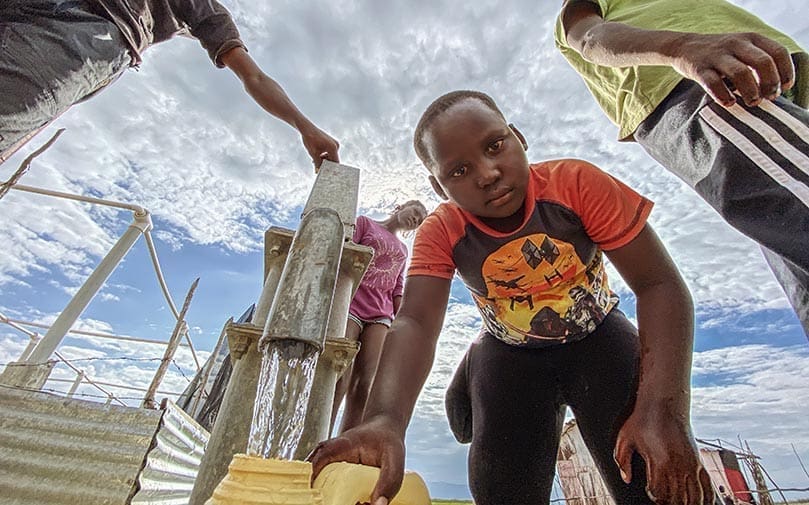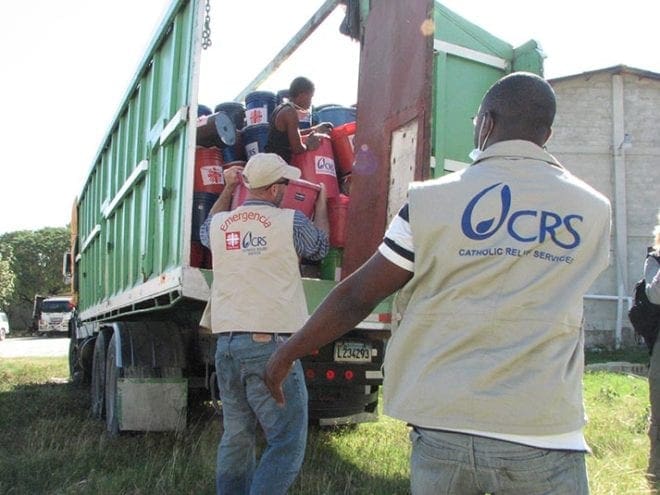 Photo by Juan Carlos Castaneda
Photo by Juan Carlos CastanedaHaiti
International relief groups encourage Georgia Catholics to give
By PRISCILLA GREEAR, Special to the Bulletin | Published December 26, 2019
PORT-AU-PRINCE, Haiti—Devastated by earthquake, cholera and hurricane over the past decade, Haiti now approached year’s end with escalating food scarcity, violence and political turmoil. And west of the Caribbean, Venezuelans continue their fight for hope and survival with a lack of necessities of food, health care and medicine.
Reaching families facing poverty, disease and disaster in the West’s most forgotten crevices, international charities Malteser International Americas (MIA) and Catholic Relief Services (CRS) invite Georgians to give life this season and support humanitarian missions to their hemispheric neighbors in crisis.
Throughout 2019, Haitians have protested rising inflation, food and gas shortages and called for the resignation of President Jovenal Moise, accused of corruption and mismanagement of the economy. And because Haiti has had no prime minister since February, the Caribbean nation has not had a budget and been unable to receive assistance from the International Monetary Fund or Inter-American Development Bank, explained MIA’s president Maj. Gen. Thomas Wessels, a parishioner at Holy Spirit Church, Atlanta.
So Haitians rely more than ever on nonprofits like Malteser, founded after World War II in Germany. The organization began working in the Americas in Haiti following the 2010 earthquake. It’s the relief agency of the Catholic Order of Malta, established in 1099 to defend Christianity and care for the wounded, sick and poor during the Crusades.
“We’re continuing because we just can’t sit back. They may not get the government situation solved but 35 to 40% of the people are hungry and we’re in Cité Soleil, which is outside Port-au-Prince, and next to Cité Soleil is Tabarre and both of those that I visited over there, that’s where it’s the ugliest (condition),” said Wessels, retired after military and banking careers.
“We basically go out and help them develop agricultural areas where they can grow their own food, set up hygiene practices so they can live more like we do for their health and to not come down with disease. It all comes from having a clean environment,” he said.
According to the Haitian National Coordination of Food Security and the Ministry of Agriculture, 3.67 million people, or 35%, currently need emergency food assistance. That percentage is expected to grow to 4.10 million by early to mid 2020 without intervention. Contributing factors include a decline in food production from a 2018 drought, inflation at 22% and currency depreciation of 24 %.
Haiti has strong ties to the archdiocese with an estimated 40,000 Haitians living in north Georgia.
“They’ve got commodity prices going through the roof, they’ve depreciated their currency— the gourde—and that just makes it more and more expensive for the people who are living there to get the basic things they need,” Wessels said. “They are suffering acute malnutrition, particularly in the kids, and we just need eventually to get them through that and get some food in their bellies and continue the reconstruction and development that we’ve been doing for years.”
With headquarters in Port-au-Prince, Malteser works with longtime local partners and raises funds to continue development projects. The plant and animal protein food security program provides families with chickens, ducks, pigs and gardens and the WASH project improves hygiene and sanitation around Cité Soleil and builds latrines and water faucets in local schools. In Belle-Anse, volunteers built an aqueduct to provide fresh drinking water. And they’ve planted mangroves on shorelines to purify water, prevent erosion, attract shellfish and counter deforestation.
Moving forward despite instability
The local Malteser staff moves ahead despite the ongoing riots, sporadic violence and roadblocks.

Donal Reilly, left, a member of CRS’ emergency response team, unloads a truck of hygiene kits at a warehouse in Port-au- Prince. The kits were packed by CRS staff and volunteers in Santo Domingo, Dominican Republic. Photo by Lane Hartill/Catholic Relief Services
Catholic Relief Services has also worked in Haiti for more than 65 years and now strives to balance security measures and services to the vulnerable through adaptation and constant communication. While schools have mostly reopened and protests subsided, conditions remain unstable.
“CRS has been able to operate because we have dedicated staff ready to work from home and to move quickly when the conditions permit to carry out activities. Roadblocks have been a major obstacle to getting work done. The United Nations has started some new logistics services including helicopter transport and more maritime options are on the horizon,” said CRS media manager Nikki Gamer. “The country has been teetering on the brink of collapse for some time now. Inflation has skyrocketed. There is a food and medicine shortage. And political unrest has led to the closure of businesses and schools. It’s also caused many aid organizations like CRS to have to suspend some of our programming.”
With a southeast regional office in Atlanta, CRS is more committed than ever to ensuring access to education and farming support, said Gamer. And as the island nation is more than 50% Catholic, the program continues building its extensive network of church and community-based partners and expanding activities to help communities increase their ability to recover after disasters.
“The work includes getting cash to the most vulnerable people in the areas affected by Hurricane Matthew coupled with nutrition programs and support in establishing internal savings groups. Our agricultural programs are helping farming families and their communities increase revenues for education and health while increasing production,” she said.
Gamer encourages the faithful to participate in the CRS Lead the Way campaigns focused on global hunger and migration and also notes their emergency relief in Venezuela in partnership with Caritas Venezuela to support Venezuelans with food, housing, health and hygiene, cash support and access to social services.
“Please don’t give up on the people of Haiti or Venezuela. These are extremely vulnerable countries that unfortunately have faced both manmade and natural disasters in recent years,” she said. “Your continued support is vital to the work that we are able to do to help the most vulnerable people in these counties survive and thrive.”
Similarly, Malteser has longstanding projects in North Colombia where they now serve many Venezuelan refugees with health care, nutrition and other basic needs near the Venezuelan border in La Guajira.
President of MIA since 2017, Wessels plows ahead to uplift God’s most vulnerable and engage Catholics and others of goodwill in the Malteser International missions in Haiti and across the Americas.
“In the military you have a mission you have to accomplish and it’s the same thing here, but the mission you have to accomplish is to allow people to live a life with dignity and it doesn’t matter their race, creed or color. And most people aren’t going to the places I have been. It’s not on the tourist map,” he said. “What I hope to do in this role is to continue to defend the faith because I’m a Knight of Malta, to help take care of the poor and sick around the world.”
For information on Malteser International Americas visit orderofmaltarelief.org; on CRS visit crs.org.